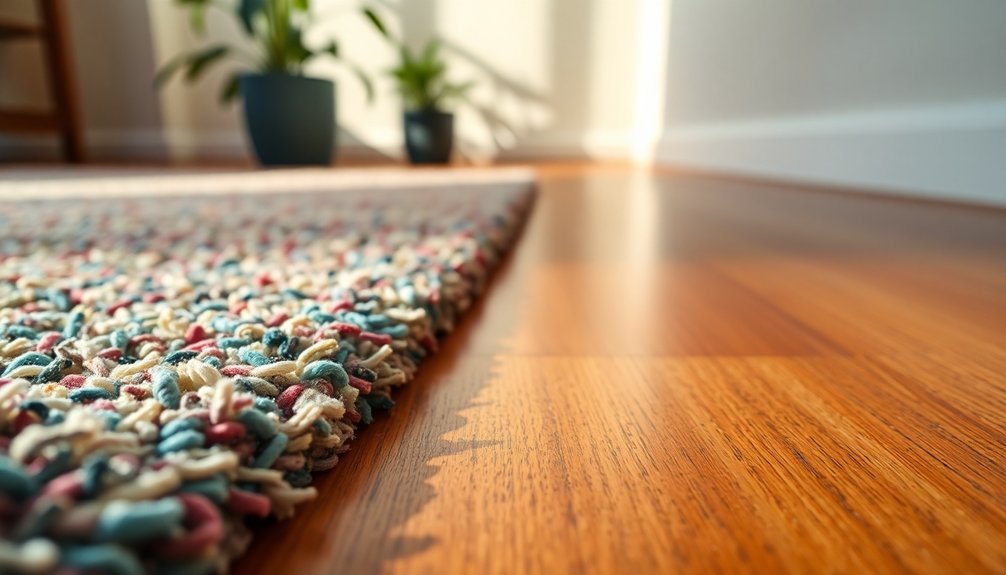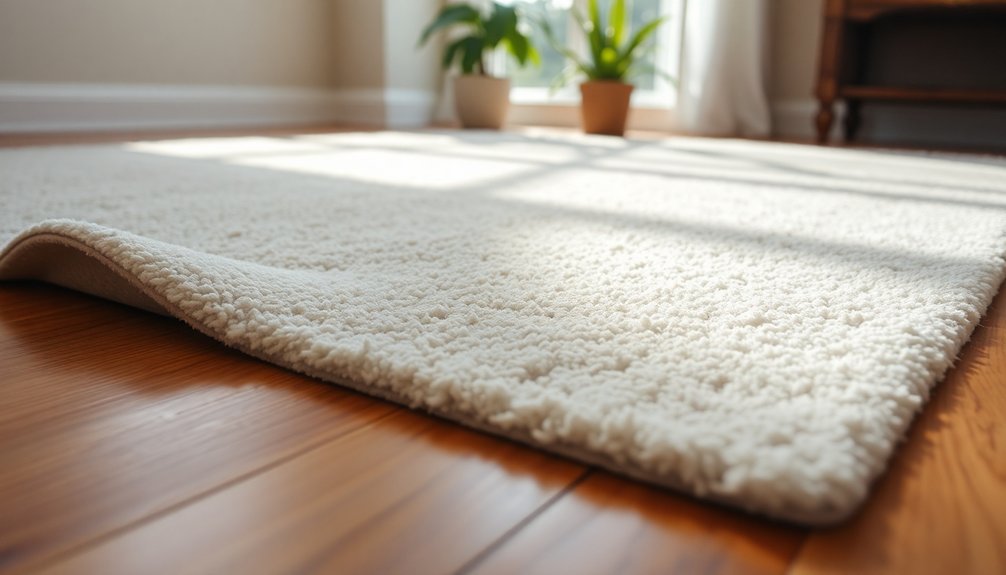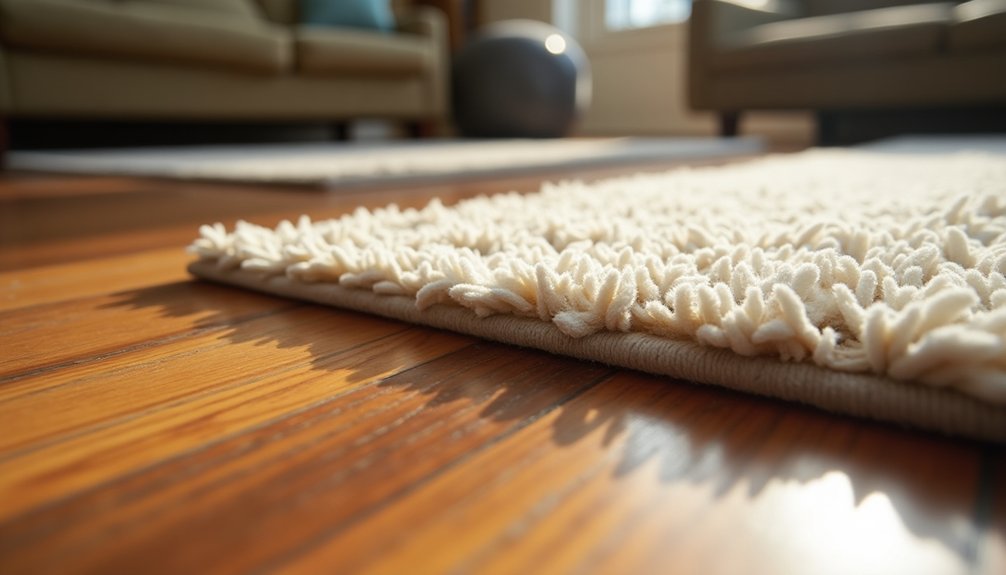Polypropylene carpets can be safe for hardwood floors if you take proper care. Their durability makes them ideal for high-traffic areas, but they can trap moisture, which might damage wood over time. To protect your floors, use quality rug pads and place rugs strategically to avoid scratches. Regular vacuuming under the carpets helps prevent dirt buildup. Be mindful of potential health issues, like VOC emissions, and consider alternatives if air quality is a concern. With the right precautions, you can enjoy the benefits of polypropylene while keeping your hardwood floors safe and sound. There's more to consider to maximize your flooring's longevity.
Key Takeaways
- Polypropylene carpets are durable and stain-resistant, making them suitable for homes with pets or children, but can trap dirt and allergens, affecting floor hygiene.
- Quality rug pads made of felt and rubber can minimize wear on hardwood floors and reduce the risk of scratches and spills.
- Regular vacuuming under rugs is essential to prevent debris accumulation that could harm hardwood flooring.
- Polypropylene may emit VOCs, which can affect indoor air quality; consider low-VOC options for better health and safety.
- Strategic placement of rugs can protect hardwood floors from wear, while avoiding tight placements to allow airflow and prevent moisture retention.
Material Properties of Polypropylene
When it comes to the material properties of polypropylene, you'll find that this synthetic fiber offers a unique combination of durability and versatility.
It's made from a blend of natural gas and oil, which gives it a semi-crystalline structure that doesn't absorb moisture. This means it's impervious to moisture, mold, mildew, and stains, making it an excellent choice for various applications. Additionally, polypropylene has a tensile strength of approximately 4,800 psi, contributing to its durability.
You'll appreciate its flexibility and softness, as it can be produced in a range of textures, from matte to glossy. Additionally, its excellent stain resistance makes it a practical option for households with children or pets.
However, it's essential to note that while polypropylene is tough, it's not as abrasion-resistant as nylon. Its oleophilic nature means it attracts oil-based dirt, so it may require a bit more effort to clean oil stains.
Though polypropylene isn't the most sustainable option compared to natural fibers like wool, it does have hypoallergenic properties, being less prone to mold and mildew.
Keep in mind that while it's water-resistant, it's not fire-resistant and can fade with prolonged exposure to direct heat or sunlight.
Durability and Maintenance Benefits
With impressive durability and minimal maintenance requirements, polypropylene carpets stand out as a practical choice for busy households. These carpets are highly resistant to wear and tear, making them ideal for homes with pets or children. They can endure messes, scratches, and high traffic without showing significant signs of damage, giving you confidence in your investment. Additionally, polypropylene carpets are also more eco-friendly than some other materials, with many options made from recycled materials, further enhancing their appeal. Maintaining polypropylene carpets is easy. A regular vacuuming routine—two to three times a week—helps keep them clean, especially in high-traffic areas. For spills, simply use a damp cloth to blot the area; avoid scrubbing to prevent damage. Annual steam cleaning is also recommended to tackle deeper dirt and grime, preserving the carpet's appearance over time. One of the biggest advantages of polypropylene carpets is their stain resistance. They can withstand spills effectively, but quick action is essential to prevent stains from penetrating the fibers. While oil-based stains require dry cleaning, most other stains can be treated promptly with minimal fuss. With these features, polypropylene carpets offer durability and easy upkeep, making them a smart choice for your home. Additionally, their hypoallergenic properties help reduce dust and allergens, enhancing safety for children and pets.
Environmental Impact Considerations

The environmental impact of polypropylene carpets is a crucial consideration for eco-conscious consumers. Since polypropylene is made from petroleum, its production contributes to greenhouse gas emissions and relies heavily on non-renewable resources. The process consumes significant energy and releases toxins into the environment, raising concerns about its sustainability compared to natural fiber rugs like wool or cotton. Additionally, polypropylene rugs are known for durability, making them a popular choice despite their environmental concerns.
When it comes to disposal, polypropylene poses challenges. It's non-biodegradable, leading to environmental pollution as it accumulates in landfills. If incinerated, it emits harmful chemicals, further harming the atmosphere. Traditional recycling methods struggle with polypropylene, but promising new solvent-based processes are being developed to recover high-grade material from carpet waste. Furthermore, polypropylene is one of the main contributors to plastic pollution, exacerbating the issue of marine debris.
Despite these challenges, polypropylene has its advantages. It's a durable and stain-resistant synthetic material, easy to clean without requiring harsh chemicals. Plus, it can be recycled into new products, helping to reduce waste. As recycling technologies improve, the environmental footprint of polypropylene carpets may lessen, making them a more viable option for eco-conscious consumers looking for balance between durability and sustainability.
Protection for Hardwood Floors
Protecting hardwood floors is vital, especially in homes with carpets. To prevent damage from foot traffic and spills, consider using self-adhering clear poly-film plastic. This protective film shields your floors from dirt and moisture. Many types of carpeting, including those made from polypropylene materials, can be safely used on hardwood floors with the right protection.
For high-traffic areas, temporary floor protection films like Pro Tect's Finished Floor Guard can last up to 100 days. Additionally, quality rug pads made of felt and rubber help minimize wear, while mats at entryways capture debris and moisture. A great option is XFasten's self-adhesive hardwood floor protection film, which sticks firmly for up to 60 days without damaging surfaces.
Ensure proper installation by using a moisture barrier, securing carpets with weather-resistant masonry nails, and avoiding latex-backed rugs that can harm your floors.
Place rugs strategically in high-traffic areas to reduce scratches and spills, but avoid tight placements to prevent warping.
Regularly vacuum under rugs to keep debris from accumulating, and maintain the carpets with low-maintenance techniques to extend their lifespan. By taking these steps, you can effectively protect your hardwood floors while enjoying the benefits of carpeting.
Health and Safety Issues

While enjoying the comfort of polypropylene carpets, you should be aware of several health and safety issues that may arise.
These carpets can release harmful chemicals and particles that impact your indoor environment. Here are four key concerns:
- Toxic Chemical Emissions: Polypropylene carpets can emit over 40 volatile organic compounds (VOCs) like benzene and formaldehyde, leading to irritation of your eyes, nose, and throat, as well as headaches and nausea.
- Skin and Respiratory Irritation: Contact with polypropylene may cause skin irritation, while inhaling fine particles can trigger respiratory issues, including asthma-like symptoms. Additionally, the fabric's production process can contribute to potential indoor air pollution, which exacerbates these health risks.
- Microplastic Shedding: These carpets shed microplastics, which can be inhaled or absorbed through the skin, contributing to health risks and environmental pollution.
- Chemical Treatments: Many polypropylene carpets are treated with harmful substances like flame retardants and PFAS, which have been linked to serious health effects, including endocrine disruption and potential carcinogenicity.
Being informed about these health and safety issues can help you make better choices for your home and well-being.
Frequently Asked Questions
Do Polypropylene Carpets Emit Odors Over Time?
Yes, polypropylene carpets can emit odors over time due to off-gassing VOCs. These compounds may irritate your eyes, nose, and throat, so it's essential to ventilate the area and consider regular cleaning to minimize odors.
Can Polypropylene Carpets Be Recycled After Use?
Yes, polypropylene carpets can be recycled after use. A new solvent-based process effectively extracts high-quality polypropylene, making it suitable for various applications. You'll help reduce landfill waste by supporting this sustainable recycling initiative.
Are There Color Options Available for Polypropylene Carpets?
Yes, you'll find a wide range of color options for polypropylene carpets, including popular shades like Desert Taupe and Rainstorm. Their colorfastness ensures vibrant hues that resist fading, perfect for any décor style.
How Do Polypropylene Carpets Compare to Wool Carpets?
Polypropylene carpets are more affordable and stain-resistant than wool, but they lack durability and plushness. If you're seeking comfort and warmth, wool might be your better option, despite its higher cost and maintenance needs.
What Is the Lifespan of Polypropylene Carpets?
Polypropylene carpets typically last around seven years, though this can vary. Factors like construction, usage, and maintenance play key roles. Proper care can extend their lifespan, so keep up with regular cleaning and maintenance.

